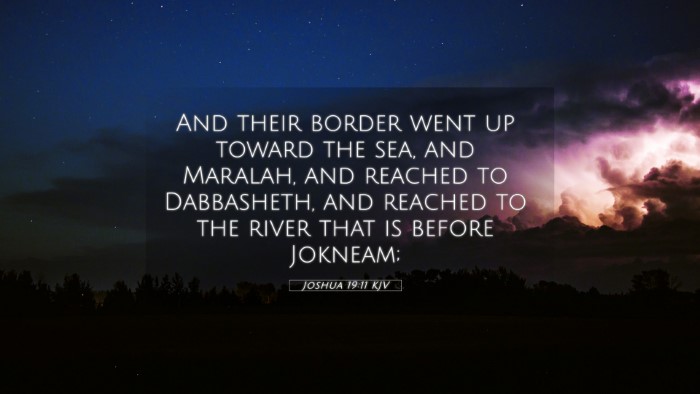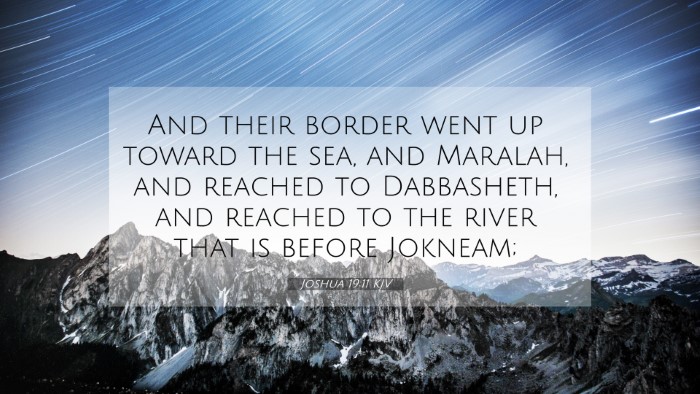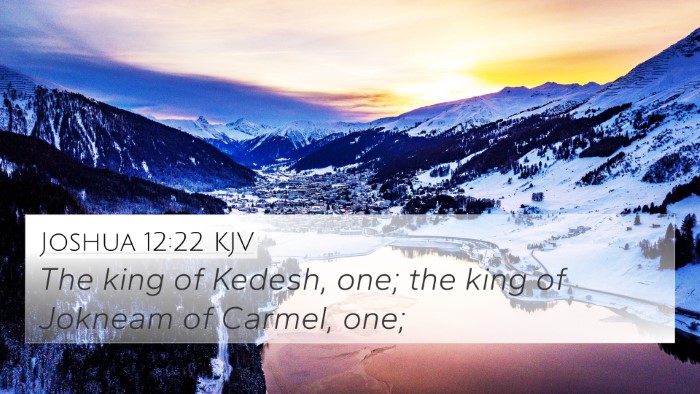Understanding Joshua 19:11
Joshua 19:11 says, “And the border of their inheritance went out westward to Maralah, and reached to Dabbasheth, and passed on to the brook that is before Jabneel, and ended at the sea.” This verse is part of the allocation of land to the tribes of Israel, specifically the tribe of Zebulun. Understanding its significance requires exploring its geographical, historical, and thematic implications through cross-referencing with other scriptural texts.
Geographical Context
The verse describes specific locations that outline the borders of Zebulun’s inheritance in the Promised Land. The river and towns mentioned indicate the strategic and prosperous nature of the territory Zebulun received. The mention of “the sea” also highlights the tribe's proximity to trade routes and access to resources.
Thematic Insights
This passage illustrates crucial themes, such as:
- Divine Allocation: The land distribution reflects God's sovereignty in providing for His people.
- Identity of the Tribes: The delineation of borders establishes the identity and heritage of the Israelites.
- Fulfillment of Promises: The land grant is a tangible fulfillment of God's promise to Abraham and his descendants.
Cross-Referencing Biblical Texts
This verse notably connects with several other scriptures, enriching our understanding through comparative analysis. Here are some relevant cross-references:
- Joshua 19:10: Provides context for the tribe's allocation preceding this verse.
- Genesis 49:13: Prophetic blessing of Jacob, linking Zebulun's role to the larger narrative of Israel.
- Deuteronomy 33:18-19: Moses’ blessing of Zebulun, emphasizing the tribe's future and responsibilities.
- 1 Chronicles 12:33: Zebulun's noted military prowess, showcasing the tribe’s evolution beyond just land.
- Isaiah 9:1-2: References Zebulun in a messianic context, uniting Old and New Testament themes.
- Matthew 4:13-16: Mentions the land of Zebulun as part of Jesus' ministry area, highlighting the fulfillment of prophecy.
- Joshua 15:11: Another example of geographical borders, offering further comparative insights.
Implications for Modern Readers
By examining Joshua 19:11 and its connections, modern readers can reflect on broader themes of:
- Faithfulness: Recognizing God’s faithfulness in fulfilling His promises.
- Community Identity: Understanding how geographical and historical contexts shape community identity.
- Resource Stewardship: The importance of recognizing the blessings of land and resources in service to God and community.
Tools for Bible Cross-Referencing
For those interested in deepening their understanding of such connections, utilizing helpful tools like a Bible concordance or a Bible cross-reference guide can enhance your study. These resources assist in identifying how to find cross-references in the Bible and provide the means for a comprehensive Bible cross-reference study.
Practical Applications
This verse prompts believers to consider:
- How to apply biblical themes in daily life by recognizing God’s provision and promises.
- Identifying connections between Old and New Testament teachings for holistic understanding.
- Utilizing Bible reference resources for in-depth Bible study and sermon preparation.
Conclusion
Through exploring Joshua 19:11, one gains insights not only into the historical context of the tribe of Zebulun but also thematic motifs that resonate throughout Scripture. The practice of cross-referencing Bible verses enhances our comprehension and appreciation of the Scriptures, fostering a deeper connection with God's Word.
